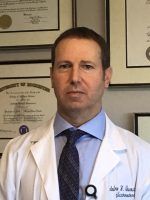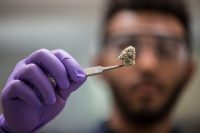On Monday, Pennsylvania Health Secretary Dr. Rachel Levine announced plans to allow patients access to whole plant, dried flower, as well as more qualifying conditions. The move reverses the previous rule permitting dispensaries to sell only processed forms of cannabis, which some say limited access and kept costs high for patients.
According to the Marijuana Policy Project (MPP), the Department of Health approved changes to the program at a hearing on Monday, which were recommended by the Advisory Board last week. While smoking remains theoretically prohibited, patients can now access the flower for vaporization.
 The medical cannabis program in Pennsylvania has only been functional for a few months now; patients began getting access to the drug back in February of 2018. In a press release, MPP says only a small number of cultivators and dispensaries are currently operating. This fact, coupled with the need to purchase processed forms of cannabis, has created product shortages and costly medicine for patients.
The medical cannabis program in Pennsylvania has only been functional for a few months now; patients began getting access to the drug back in February of 2018. In a press release, MPP says only a small number of cultivators and dispensaries are currently operating. This fact, coupled with the need to purchase processed forms of cannabis, has created product shortages and costly medicine for patients.
It is expected that this move could help alleviate some of those problems in the state’s new program. “Allowing cannabis in its natural, flower form and expanding the list of qualifying conditions will have a huge positive impact on seriously ill Pennsylvanians,” says Becky Dansky, legislative counsel for the Marijuana Policy Project, who helped lead the legalization effort in Pennsylvania’s legislature. “By being able to provide medical marijuana in plant form, producers will be able to get medicine into the hands of patients much more quickly and for much lower cost to patients,” says Dansky. “This is vitally important for patient access right now while the program is still getting off the ground and production is not yet at full capacity. We hope these rules are promulgated as quickly as possible so even more patients will be able to find relief.”
The qualifying conditions added to the list for patients seeking medical cannabis is set to include cancer remission therapy as well as opioid-addiction therapy, which are two very notable additions. With more qualifying conditions and a potentially cheaper form of medicine, these changes could improve the program’s efficacy in treating patients.

















 “The PA Medicinal Cannabis Education Tour seeks to rectify the current lack of education on medicinal cannabis by providing current, reliable information on medicinal marijuana and its uses,” reads the press release. The events come at an opportune time: Pennsylvania recently
“The PA Medicinal Cannabis Education Tour seeks to rectify the current lack of education on medicinal cannabis by providing current, reliable information on medicinal marijuana and its uses,” reads the press release. The events come at an opportune time: Pennsylvania recently 


















